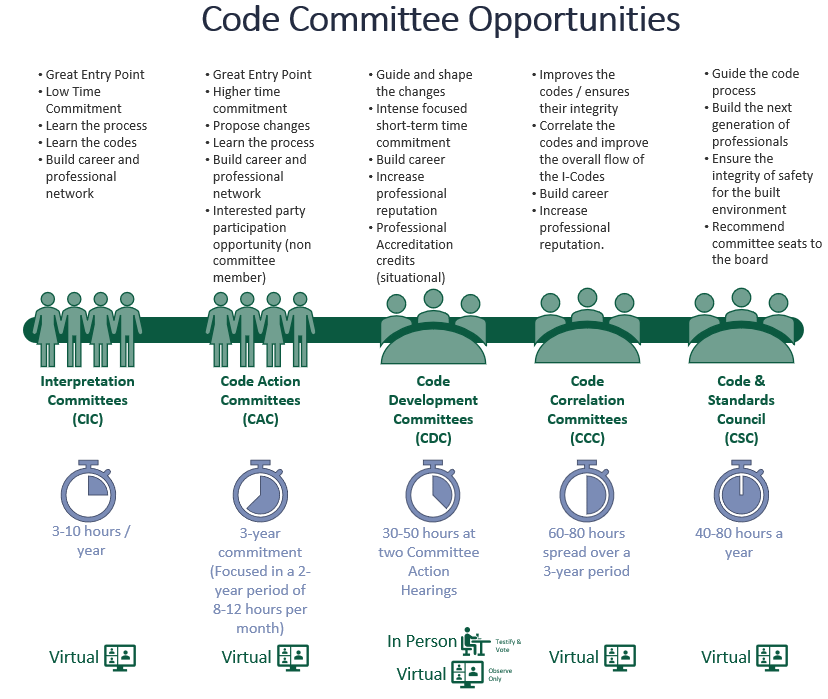
Exploring Ways to Get Involved in the Code Development Process
The I-Codes are developed through a transparent and democratic process that helps ensure we have the best possible model safety codes.
The International Codes® (I-Codes), developed by the International Code Council, are a family of fifteen coordinated, modern building safety codes that help ensure the engineering of safe, sustainable, affordable and resilient structures. The I-Codes are developed through a transparent and democratic process that allows anyone to get involved and helps ensure we have the best possible model safety codes to support the built environment.
The work done by the Code Council’s Code Development Committees impacts the lives of nearly two billion people around the world. There are many opportunities for you to get involved in these committees while simultaneously improving your professional skills and knowledge.
These opportunities range from small to significant time commitments, span across all skills and trades within the building industry and include both beginners to seasoned code experts.
There are almost 400 seats available on the various committees serving three-year terms. Additionally, you can get involved in the Code Council’s Committee Action Hearings (CAH) and Public Comment Hearings (PCH) that occur on a three-year cycle.
In honor of Week 4 of the Code Council’s Building Safety Month campaign, we are sharing some areas where you can get involved to help improve building safety around the world.

Code Interpretation Committees (CIC)
The Code Council’s Interpretation Committees provide technical support for adopting jurisdictions by processing official interpretations of the I-Codes. Code Interpretations represent the official position of the Code Council. In all cases, the final authority on matters of interpretation is the code official.
- Time Commitment: Low (3-10 hours per year)
- Experience: No experience in the code process needed
- Knowledge of the Code: New to seasoned
Code Action Committees (CAC)
The purpose of the Code Council’s Code Action Committees are to identify areas of the code for improvement, introduce new areas of safety for the built environment or clarify existing code.
- Time Commitment: Medium, three-year commitment which is predominately a two-year focused effort starting the year preceding the code cycle hearings. Members are encouraged to also attend the committee action hearings and public comment hearings
- Experience: No experience in the code process is needed. Related industry experience across the built environment important
- Knowledge of the Code: New to seasoned
Code Development Committees (CDC)
Code Development Committees are an instrumental part of the Code Council’s Code Development Process. There are currently 15 Code Committees, responsible for the review and evaluation of code change proposals for the next edition of the I-Codes.
- Time Commitment: Medium, focused on two specific committee action hearings for either group A or group B of the code development cycle
- Experience: Code committee or code hearing experience preferred. Applicable industry experience and its relationship to the relevance/impacts of safety in the built environment
- Knowledge of the Code: Solid to seasoned knowledge of the I-Codes and applicable safety standards
Code Correlation Committees (CCC)
The Codes and Standards Council is a critical advisory committee to the Code Council. While they advise the leadership of the Code Council on matters of policy, procedure and safety for the built environment, they also provide a crucial role in ensuring the next generation of professionals in the built environment are developed to carry the strong legacy of safety across the industry moving forward.
The CSC reviews the applications for all codes and standards committees and then recommends appointments to the Code Council Board of Directors. They are leaders in the industry with a strong commitment to the mission of the Code Council.
- Time Commitment: Significant
- Experience: Senior professionals in the built environment and considerable experience in the I-Codes process and committees
- Knowledge of the Code: Seasoned knowledge of the I-Codes, applicable safety standards and working knowledge of the standards development process
To learn more about the Code Council’s Code Development process, visit here.
To visit week four of the Code Council’s Building Safety Month campaign, visit here.








